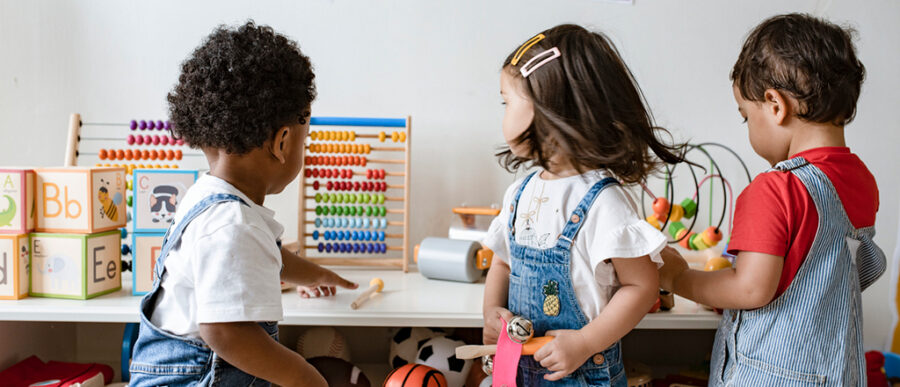DEFINITION OF COGNITIVE DEVELOPMENT
Cognitive development is the development of knowledge, skills, and problem solving. This influences how children think and figure things out. Brain development, including executive functioning, is a part of cognitive development as well. Preschoolers very literal in their way of thinking, but also are becoming better at pretend play, which is why they are able to learn so well through play.
COGNITIVE DEVELOPMENT MILESTONES
- Remembers parts of a story
- Names familiar colors
- Better understands time (morning, afternoon, night)
- Understands the concept of “two”
- Thinks about things in very concrete terms
- Struggles to see things from others’ perspectives
- Begins to think symbolically
COGNITIVE DEVELOPMENT ACTIVITIES
Cognitive development is so important to your child’s overall development, which is why it is essential that you support that development through play.
BOARD GAMES
Although it is important to keep board games that you play with your preschooler simple, they are very beneficial to their cognitive development. Board games give children a chance to make choices, practice counting, and practice skills such as matching.
STACKING AND BUILDING GAMES
Building towers with your preschooler is a great opportunity to practice skills such as counting, one-to-one correspondence, and predicting cause and effect. One way that you can do this is by making building with your preschooler even more fun by making it a game. Take turns rolling a dice and adding the number of blocks that the dice shows. Continue this until the towers are too tall and one falls.
READ BOOKS
Reading to young children is a great way to foster development in all developmental domains. Not only do preschoolers observe essential speech and language skills being modeled when being read to, but they are also exposed to knowledge about how the world works. Listening to stories helps children see things from different perspectives and see how others solve problems. Below are 5 books we recommended.
1. Hair Love by Matthew A. Cherry and Illustrated by Vashti Harrison
It can be tough to find a father-daughter tale. In this book, a tie-in to Academy-Award Winning Short Film “Hair Love,” a girl named Zuri describes all the different ways her hair can look. Then her Daddy offers to work through some trial and error to give her yet another hairstyle she’ll love. It’s a message about self-confidence and loving the hair that you’re born with.
2. Just One Flake by Travis Jonker
This new story also made our 2023 best-of list. “This book celebrates the uniqueness in all of us,” said our judge Jenna Bush Hager. “My youngest, Hal, laughed out loud.” The boy, Liam, comes up with inventive ways to try and get snow on his tongue, a lesson in creativity. In the end, he gets more snow than he bargained for!
3. There Is a Bird On Your Head! by Mo Willems
Does your 4-year-old show interest in sounding out words? They might be able to pick out a few in any of the 25 simple — and simply hilarious — Elephant and Piggie books. Author and illustrator Mo Williams uses the most basic of language and repeats words to tell stories of happy Piggie and grumpy, worried Elephant. Show your preschooler the word “bird,” for instance. This one won the 2008 Theodor Seuss Geisel Award, named for Dr. Seuss, an award that goes to the year’s most distinguished book for early readers.
4. The Pout-Pout Fish by Deborah Diesen and Illustrated by Dan Hanna
Expressive, shimmery fish rule this fun read-aloud picture book that ultimately helps 4-year-olds deal with their big feelings. “The Pout-Pout Fish offers a creative way of teaching kids about emotions and how to turn ‘dreary-wearies’ into ‘cheery-cheeries,'” says one mom of a 4-year-old, echoing others who enjoy this read. “My son loves pointing out all the different sea creatures — squid, jellyfish, octopus, clam. He especially gets a kick out of Pout-Pout Fish’s catchphrase, ‘blub, bluub, bluuuuub,’ and insists I say it with an exaggerated ‘pout-pout’ frown. Admittedly, the rhyming and alliteration can get kind of tongue-twisty to read but that’s all part of the fun.”
5. We’re Going On A Bear Hunt by Michael Rosen and Helen Oxenbury
If you don’t yet have this classic in your library, get it while your 4-year-old is still young enough to love the delicious anticipation of finding and escaping from the bear. It also introduces sequence: Readers follow the family swishy-swashying through grass and splash-sploshing through water on their way to a cave, then going in reverse order on their way out.
PRETEND PLAY
At the stage of development where their pretend play is just starting to blossom. They love to have tea parties and play house. Most of their pretend play is based on their own real life experiences, which gives them a chance to practice problem solving and critical thinking skills in their play before putting them to real use.
You can help your child meet their cognitive development milestones by providing them with meaningful play experiences both independently and with their peers. Children learn best through play, and also through hands-on experiences with the world around them to learn how things work and how to problem solve.

